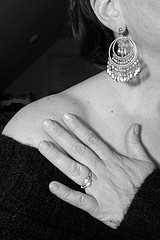
Author: Malcolm Gladwell
I have gone through my life trusting my intuition and making what others would call snap decisions. It has always seemed that I’ve just “known” what I had to do, where I had to go, or the character of a person within the first few minutes. I’ve gone with decisions that feel right. It’s almost as if I can see the path as a result of the decision. When I read this book I felt like my way of approaching life was validated.
Blink: The Power of Thinking without Thinking
(ISBN: 0316172324 Format: Hardcover, 288pp Pub. Date: January 2005 Publisher: Little, Brown & Company)
From the Publisher: How do we make decisions--good and bad--and why are some people so much better at it than others? That's the question Malcolm Gladwell asks and answers in the follow-up to his huge bestseller, The Tipping Point. Utilizing case studies as diverse as speed dating, pop music, and the shooting of Amadou Diallo, Gladwell reveals that what we think of as decisions made in the blink of an eye are much more complicated than assumed. Drawing on cutting-edge neuroscience and psychology, he shows how the difference between good decision-making and bad has nothing to do with how much information we can process quickly, but on the few particular details on which we focus. Leaping boldly from example to example, displaying all of the brilliance that made The Tipping Point a classic, Gladwell reveals how we can become better decision makers--in our homes, our offices, and in everyday life. The result is a book that is surprising and transforming. Never again will you think about thinking the same way.
And this profile just published in the New York Times:
The Gladwell Effect
By RACHEL DONADIO
Published: February 5, 2006 NYT
"PEOPLE are experience rich and theory poor," the writer Malcolm Gladwell said recently. "People who are busy doing things — as opposed to people who are busy sitting around, like me, reading and having coffee in coffee shops — don't have opportunities to kind of collect and organize their experiences and make sense of them."
With a writerly verve and strong narrative powers, he leavens serious social science research with zany characters and pithy, easily digestible anecdotes. Gladwell selects his anecdotes from a wide range of sources — the military, business, food, music, romance — and diverse locales, a tactic that broadens his books' appeal.
…In "The Tipping Point," he discusses everything from the drop in crime in
Similarly, in "Blink," he introduces a range of case studies and experts, including art historians who can tell within seconds that a statue is a fake and a psychologist who can predict whether a couple will get divorced after observing them for only a few minutes. His message is that we should trust first impressions — except when we shouldn't. Gladwell, who is multiracial, said he became interested in first impressions when he grew his hair into an Afro and then was repeatedly pulled over for speeding, and stopped once by the police looking for a rapist with similar hair. In an era of increased specialization and niche thinking, Gladwell himself is the ultimate "connector," bridging disparate universes: the

No comments:
Post a Comment